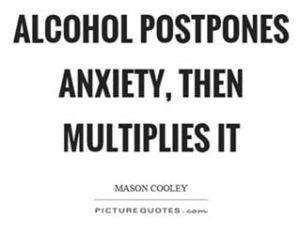It’s obvious that these are stressful times but have you considered that drinking too much may be adding to your anxiety?
This is a very frightening time, and people all over the country are suffering anxiety, unsure about what’s going to happen. You turn on the TV or go online and the news can be unpredictable and scary. Will there be another lockdown? Where are we allowed to travel? How can I go back to work? Folk are worried the crisis may make it hard to make ends meet. They may be concerned about the health of the elderly and vulnerable, as well as their own wellbeing. There is no question it can be very stressful, and some people have been turning to alcohol to try and overcome it.
Trying to Deal with Anxiety by Drinking too Much
 Even under ordinary circumstances, studies have shown more than half of UK adults drink to deal with stress. If they have had a bad day at work, or experience relationship or money worries, they may over-consume alcohol. It can be used as a form of escape, to cheer themselves up or to relax. In a Covid-19 world it is even more tempting to binge or drink every day. But, ironically, if you drink too much, it may add to psychological issues and possibly heighten the problem.
Even under ordinary circumstances, studies have shown more than half of UK adults drink to deal with stress. If they have had a bad day at work, or experience relationship or money worries, they may over-consume alcohol. It can be used as a form of escape, to cheer themselves up or to relax. In a Covid-19 world it is even more tempting to binge or drink every day. But, ironically, if you drink too much, it may add to psychological issues and possibly heighten the problem.
It is estimated around 16 million people in the UK are struggling with mental illness, which can be partly attributed to stress. There are many who feel alcohol, when taken in moderation, can help you feel relaxed. But, while drinking may provide some enjoyment, and negate feelings of stress in the short term, it could exacerbate it in the long run.
This can be attractive in the current circumstances to drink a lot when some enjoyment is desirable wherever you can find it.
Alcohol can Affect Brain Chemistry
However, if you regularly drink to excess, it could affect both your central nervous system and brain chemistry. Alcohol can slow down processes, and, as it is a depressant, can disrupt the neurotransmitters in the brain required for good mental health. You may see the initial relaxation subside, and then display a change of personality. This may include becoming more irritable, aggressive or morose; exhibiting the symptoms of depressive illness.
Therefore, if you use alcohol, it is advisable to try reducing your intake, or only drink at a social level. You do not want your consumption to reach the point it could be considered excessive, or an everyday occurrence. It costs money and possibly your family, friendships or health. Many believe drinking too much could intensify your anxiety and depression, adding to your initial problems with stress. So, if you are concerned about your alcohol consumption please contact WhichRehab for advice.
References:


